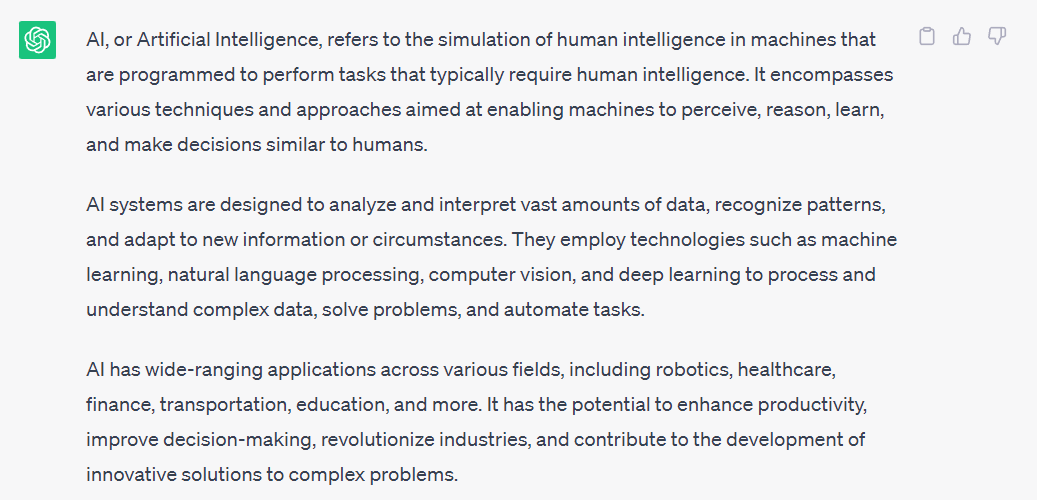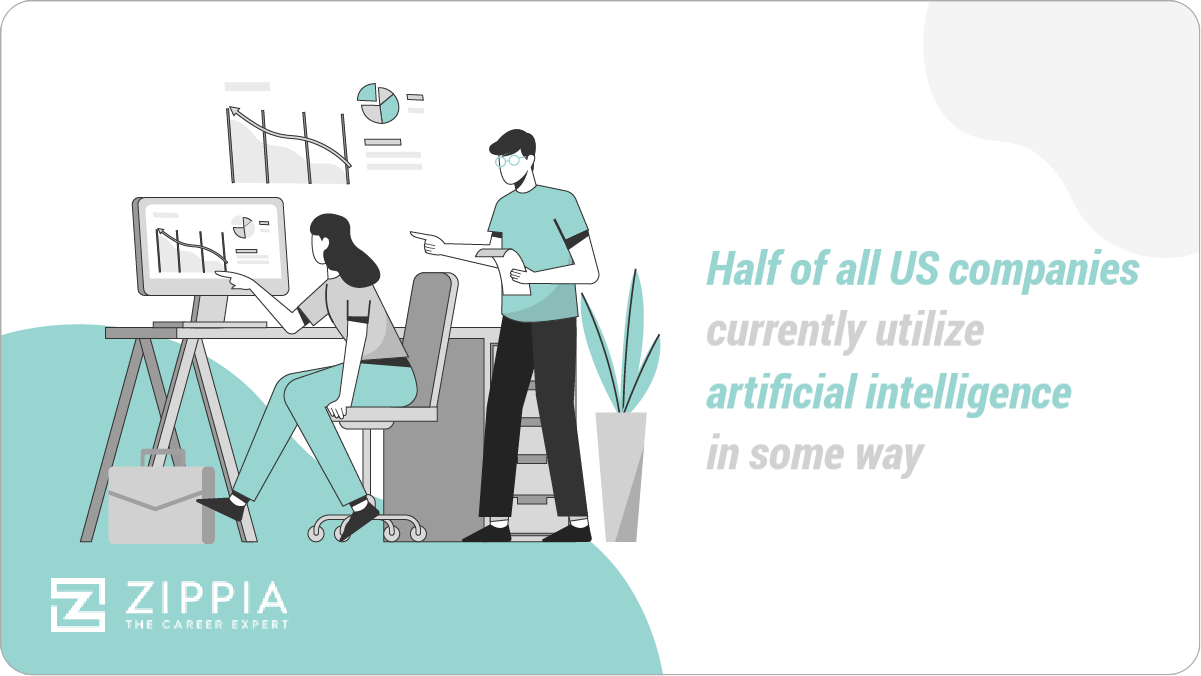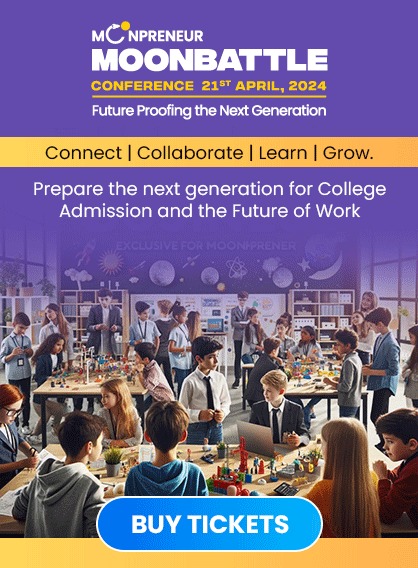
Have you ever thought about asking the AI to give its definition of AI? What would it say about itself? Let’s find out.

Was this definition better or worse than what your computer teacher taught you at school?
99% of people would find this definition highly comprehensive and self-explanatory, leaving little to no room for further elaboration.
Now, let’s explore some further possibilities.
Could AI replace teachers within the classroom?
Is it capable of fulfilling the role of an after-school tutor?
Can intelligent technologies like ChatGPT4 become the mentor you’ve sought all these years?
Indeed, the prevailing notion is that AI has the potential to impact and transform numerous professions in the future. Roles such as tutors, mentors, proofreaders, administrators, designers, and many others could be influenced by AI’s progress.
While some tasks within these professions can be automated or augmented by AI, it’s important to note that AI is not solely focused on replacing humans but rather enhancing their capabilities and productivity.

It’s crucial to approach the topic with a balanced perspective, recognizing that while AI may bring changes to the job market, it also creates opportunities for the development of new roles and the augmentation of existing ones.
What do statistics say about the impact of AI on Jobs?
According to a recent study conducted by Zippia Research, the growing utilization of computers, intelligent machines, and robots is projected to displace 400 million and 800 million jobs by 2030. The impact is expected to be more pronounced in industries where soft skills, such as interpersonal communication or emotional intelligence, are not integral to the job requirements.

While it is true that AI and automation can automate routine and repetitive tasks, leading to potential job losses, it’s important to consider the nuances and uncertainties surrounding these statistics. Here are a few points to elaborate on the statement:
1. The scale of Job Loss:
The mention of “hundreds of millions” of job losses indicates a large-scale impact. However, it’s crucial to recognize that such figures are projections and subject to various factors, including the pace of technological advancements, adoption rates, and potential mitigating measures.
2. Industry Variations:
The jobs that require planning, learning, reasoning, problem-solving, and prediction may be more vulnerable to AI-related job loss. This aligns with the general understanding that tasks involving repetitive or rule-based activities are more susceptible to automation. However, the degree of vulnerability varies across industries, and the impact on specific job categories can differ.
3. Importance of Soft Skills:
Creativity, networking, people management, and interpersonal communication are often considered uniquely human strengths that are less likely to be automated. Jobs that require high levels of human interaction, complex decision-making, or creative problem-solving are generally expected to be less susceptible to complete automation.
Recommended Reading: 10 Soft Skills To Teach Your Kids In 2023
While some jobs may be eliminated or transformed by AI, new roles and opportunities can emerge. The evolving landscape may require individuals to develop a combination of technical and non-technical skills that complement AI technologies, leading to the creation of hybrid job roles and new avenues for employment.
“Adaptation, upskilling, and embracing collaboration between humans and AI are key factors in navigating the evolving landscape of work in the AI era”.
6 Ways to Stay Competitive in the AI Age
1. Upskilling is Key
In the AI age, upskilling refers to acquiring new skills or enhancing existing ones to adapt to the changing technological landscape. This can involve learning programming languages, data analysis, machine learning, or other AI-related skills. Upskilling enables individuals to understand and work with AI technologies effectively and equips them to leverage AI tools and applications to enhance their productivity.
2. Introduce STEM Education
School systems should implement STEM (Science, Technology, Engineering, and Mathematics) curricula to help students learn diverse skills needed to thrive in the AI Age. By introducing STEM subjects early on, schools provide students with a strong foundation in analytical thinking, problem-solving, and logical reasoning.
3. Embrace Lifelong Learning
Continuous learning is crucial in the AI age. Seek courses, workshops, and online resources to enhance your knowledge and skills. Cultivate a growth mindset and embrace the idea of lifelong learning to adapt to the changing demands of the job market.
4. Develop Unique Human Skills
While AI excels at automating certain tasks, it is essential to focus on developing skills that are uniquely human such as critical thinking, creativity, emotional intelligence, problem-solving, and adaptability. These skills are difficult to replicate by machines and can provide a competitive advantage in domains that require complex decision-making, innovation, and interpersonal interaction.
5. Foster Collaboration with AI
Rather than viewing AI as a replacement, embrace it as a tool for collaboration and augmentation. Explore ways to integrate AI technologies into your work processes to enhance productivity and efficiency. Identify areas where AI can complement your skills and expertise, allowing you to focus on higher-value tasks while leveraging the capabilities of AI systems.
6. Cultivate Domain Expertise
Developing deep knowledge and expertise in a specific domain can be a valuable asset in the AI age. By becoming a subject matter expert, you can leverage AI technologies to analyze data, derive insights, and make informed decisions. Combine your domain expertise with AI-driven insights to gain a competitive edge and provide unique value to your organization or clients.
The AI landscape is dynamic, and new technologies and approaches emerge rapidly. Stay agile and adaptable in your approach to work and embrace change. Be open to experimenting with new tools and techniques, and be willing to learn from failures and iterate on your strategies.
A flexible and adaptive mindset will enable you to navigate the evolving AI landscape and seize emerging opportunities. Good Luck 🙂
Moonpreneur is on a mission to educate and ignite the flames of entrepreneurship through our holistically created online STEM programs, which will help kids master the futuristic sciences such as Robotics, Game Development, App Development, Advanced Math, and much more!!
Register for a free 60-minute robotics workshop today!

















How should I give human touch to my AI text?
If you’re a writer trying to keep your own style or a brand aiming to be noticed, I’ve got seven easy tips to make AI content feel more human.